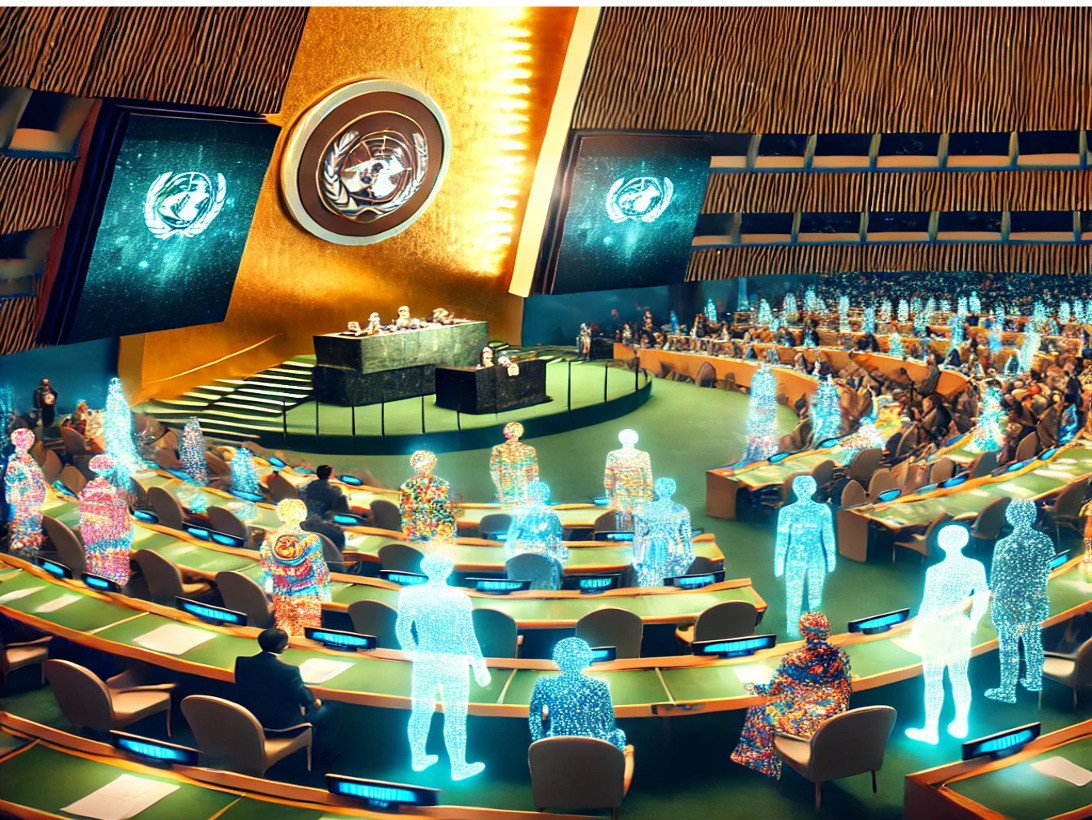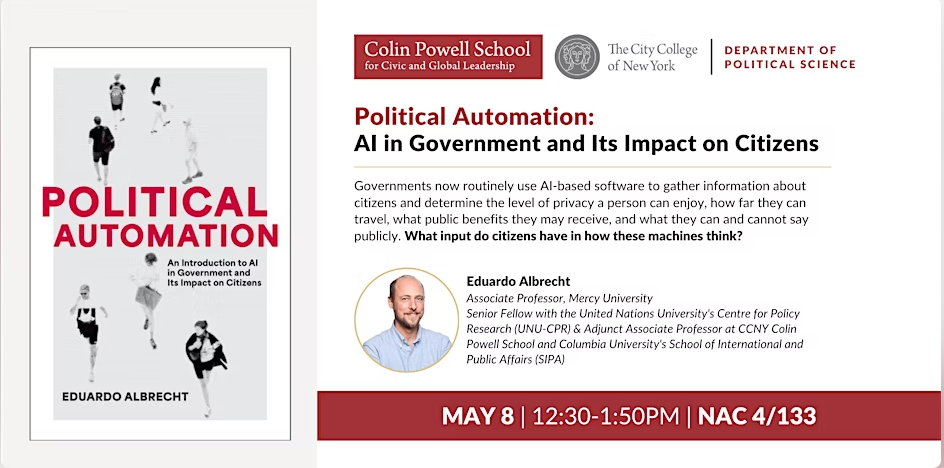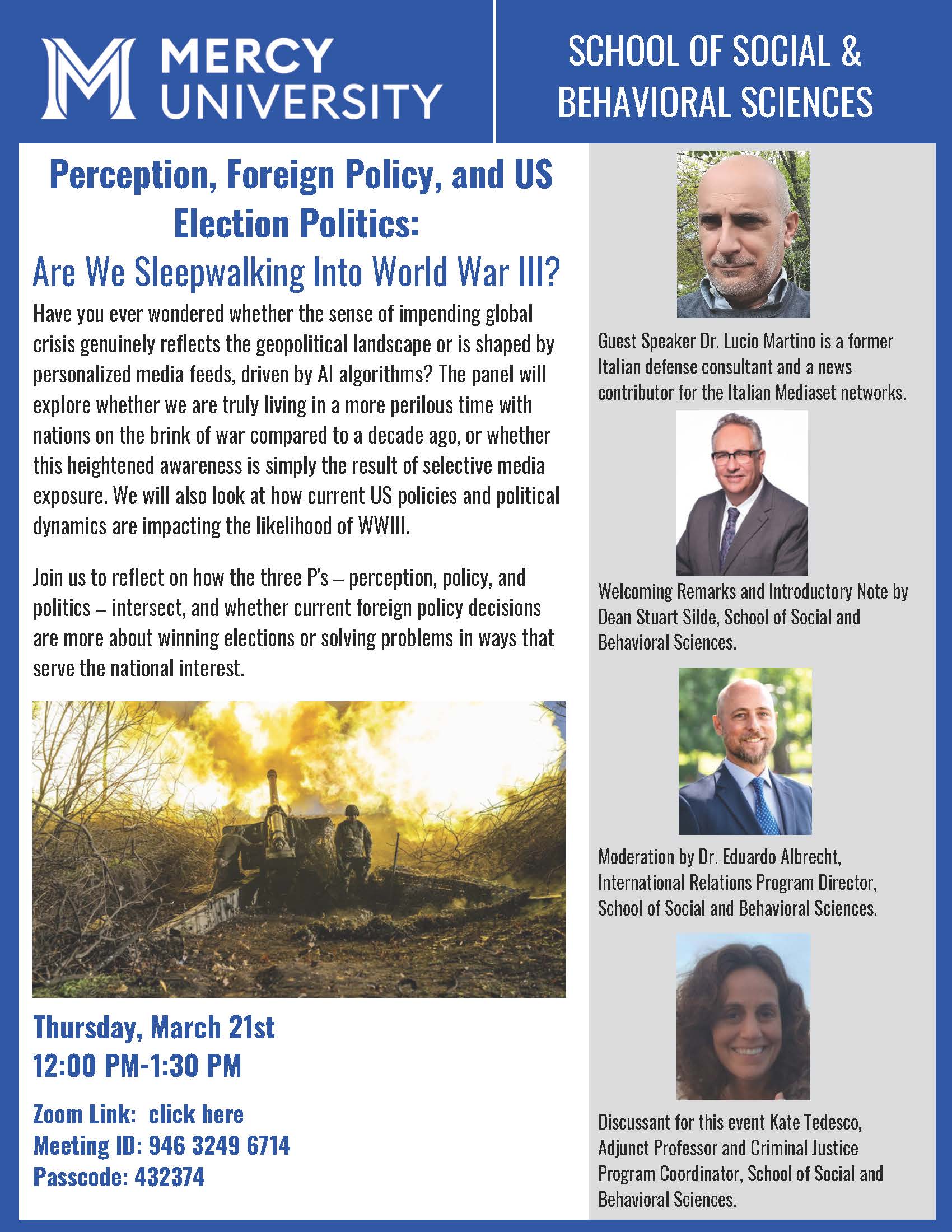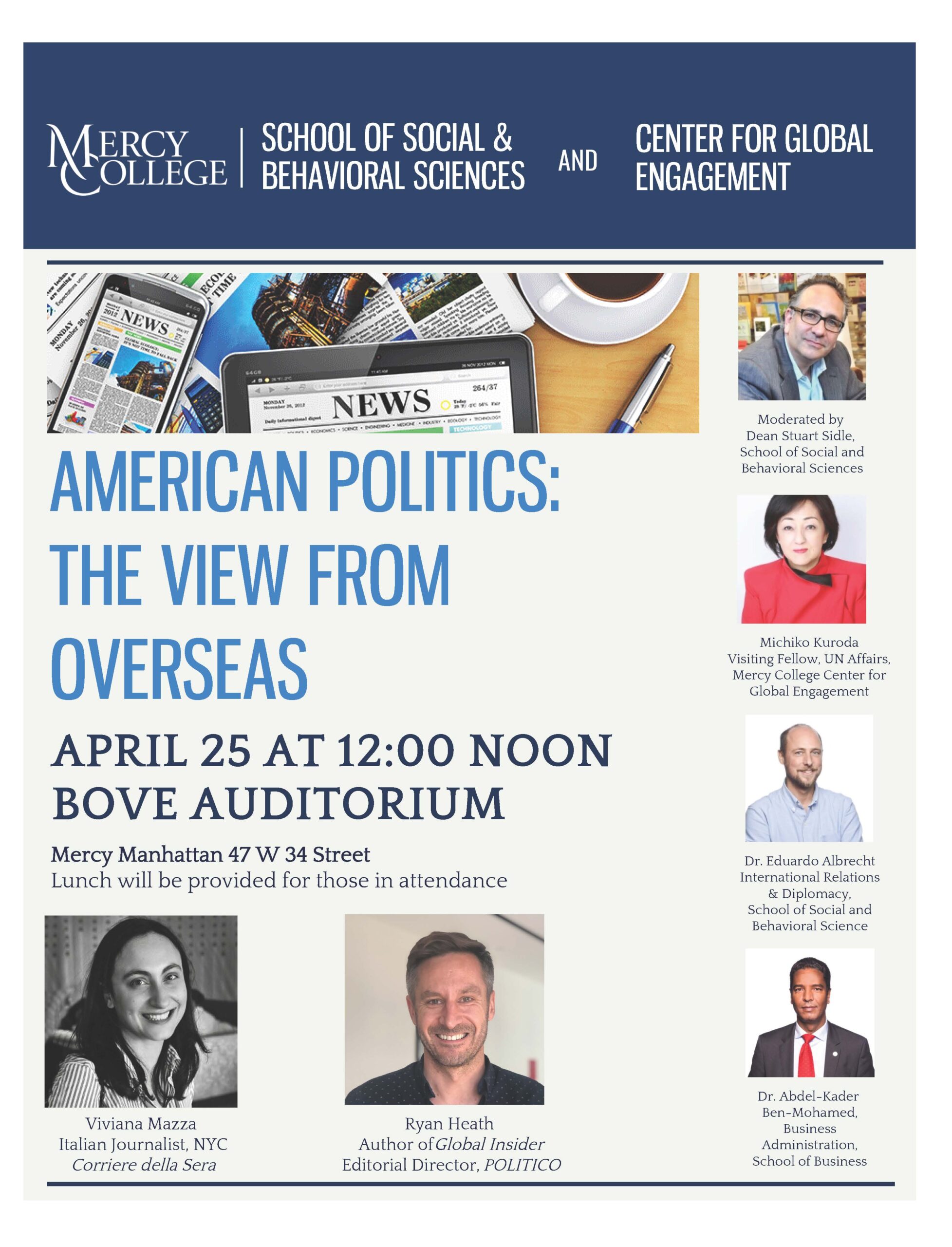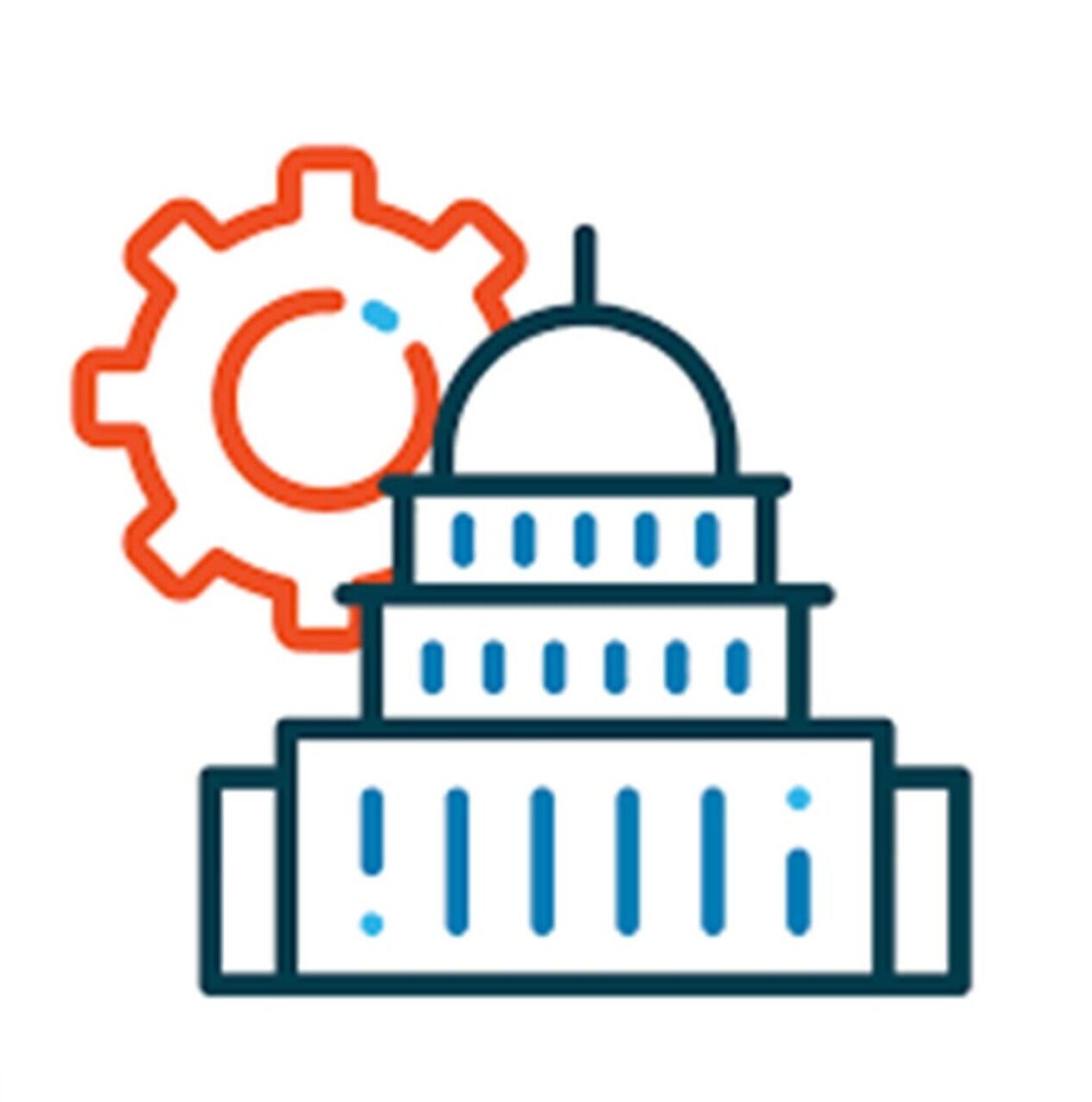AI Agents in Global Governance: Digital Representation for Unheard Voices
Artificial intelligence is reshaping multilateral decision-making by giving voice to previously unheard stakeholders. Based on my recent book, Political Automation: An Introduction to AI in Government and Its Impact on Citizens (Oxford University Press, 2025), I argue that AI agents can help international organizations better incorporate marginalized communities into global governance frameworks.
Political Automation Book Launch at Colin Powell School for Civic & Global Leadership
Governments now routinely use Al-based software to gather information about citizens and determine the level of privacy a person can enjoy, how far they can travel, what public benefits they may receive, and what they can and cannot say publicly. What input do citizens have in how these machines think?
Book your free tickets at the link below for the launch of Political Automation: AI in Government and its Impact on Citizens at the Colin Powell School for Civic & Global Leadership on Thursday, May 8 · 12:30 - 1:50pm EDT.
Reboot Democracy Blog - Branching Out: A Third Legislative Chamber for the AI Age
The proliferation and collection of large amounts of citizens’ data has led to the rise of "political machines" – AI systems used in government to make decisions around resource allocation. Political anthropologist Eduardo Albrecht argues that establishing a "Third House" – a new legislative body specifically designed to oversee the deployment and operation of political machines – could enable citizens to meaningfully engage with and oversee the AI tools used by their government.
Read the full blog here.
John Cabot University Interview - Political Automation: Alumnus Eduardo Albrecht Publishes New Book on AI
JCU alumnus Eduardo Albrecht (class of 1999, International Affairs and History) has recently published his new book, titled Political Automation: An Introduction to AI in Government and Its Impact on Citizens (Oxford University Press, 2025), which investigates the increasing governmental use of AI and theorizes the changing role of citizens in policy making.
Read the full interview here.
AI in Government: A SIPA News Q&A with Political Anthropologist Eduardo Albrecht
In his new book, Political Automation: An Introduction to AI in Government and Its Impact on Citizens (Oxford University Press), Eduardo Albrecht, a SIPA professor and political anthropologist, examines how states deploy AI to make consequential decisions about their citizens. He proposes a revolutionary “Third House” of government—a virtual legislative chamber dedicated to AI oversight and governance.
Albrecht, who is also a senior fellow at the United Nations University’s Centre for Policy Research, draws on extensive fieldwork and ethnographic interviews with rights activists to document both the current state of algorithmic governance and emerging citizen responses.
In this SIPA News Q&A, Albrecht discusses the profound implications of AI-mediated governance, the risks of surrendering human judgment to automated systems, and his vision for preserving citizen agency through the creation of “digital citizens” who would represent citizens’ interests in an increasingly automated public sphere.
Read the full interview here
IPI Global Observatory Blog - Political Machines: The Rise of Automated Governance and the Global Challenge to Citizens’ Rights
In December 2023, the United Nations (UN) Secretary-General’s High-level Advisory Body on Artificial Intelligence published its interim report highlighting the need for stronger regulatory frameworks around AI systems. In September 2024, at the UN Summit of the Future, the Global Digital Compact was adopted, establishing crucial guardrails for AI technologies.
Read the full blog here.
Cybersecurity Threats to Global Peace - UNSCripted Podcast
In June I was invited by Damilola Banjo to appear on the podcast UNSCripted by PassBlue, an independent media platform dedicated to reporting on issues related to the United Nations and global diplomacy.
The podcast featured an interview with UN Ambassador Joonkook Hwang, the permanent representative of South Korea (holders of the Security Council presidency for June).
The theme under discussion was the threat of cybersecurity to global peace. I was asked to provide context on emerging technologies and their impact on international governance.
The conversation addresses: Why South Korea is making cybersecurity a Security Council matter at this time; why cyber-attacks were becoming North Korea’s weapon of choice; and what changes we are like to see in the Security Council.
Read the full interview here.
Listen to the podcast here.
Perception, Foreign Policy, and US Election Politics: Are We Sleepwalking Into World War III?
Event hosted by the School of Social and Behavioral Science at Mercy University: ‘Perception, Foreign Policy, and US Election Politics: Are We Sleepwalking Into World War III?’ on March 21st, 2024 at 12:00 noon.
Discussion with our guest speakers: Dr. Lucio Martino, former Italian defense consultant and a news contributor for the Italian Mediaset networks, and Kate Tedesco, Adjunct Professor and Criminal Justice Program Coodinator, School of Social and Behavioral Science.
American Politics: the view from overseas
Event hosted by the School of Social and Behavioral Science and Center for Global Engagement: ‘American Politics: the view from overseas’ on April 25, 2023 at 12:00 noon in the Bove Auditorium.
Discussion with our guest speakers: Viviana Mazza, Italian Journalist, NYC Corriere della Sera, and Ryan Heath, Author of Global Insider Editorial Director, POLITICO, alongside some of Mercy’s professors School of Social and Behavioral Science and School of Business.
American Politics - The View from Overseas 04 25 2023
Forthcoming from Oxford University Press - Political Automation: An Introduction to Driverless Government from Policing to Peacekeeping
Governments increasingly use AI-based software to produce policy decisions according to a set of programmed instructions. These "bureaucratic bots" routinely gather information about our lives and decide matters of resource allocation; they determine, for example, who gets policed and who gets state benefits. As automation edges up the ladder of cognitive skills, increasingly complex policy-making functions will be taken over from human supervision, including on matters of national security and international peacekeeping. The role of humans in the act of policy production itself is therefore changing, as many find themselves at a new "frontier" of citizenship. This book (forthcoming 2023), will explore that frontier.
